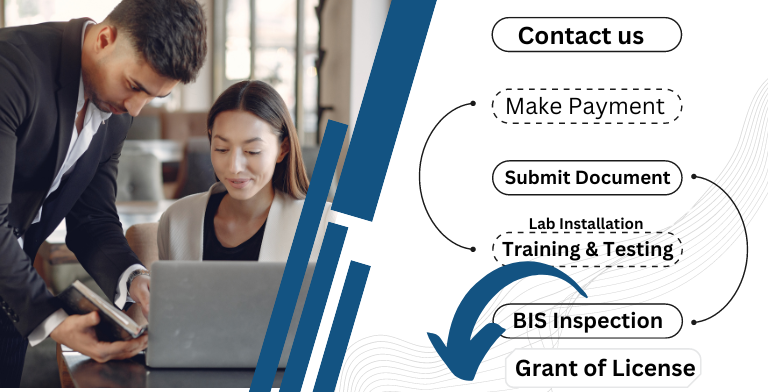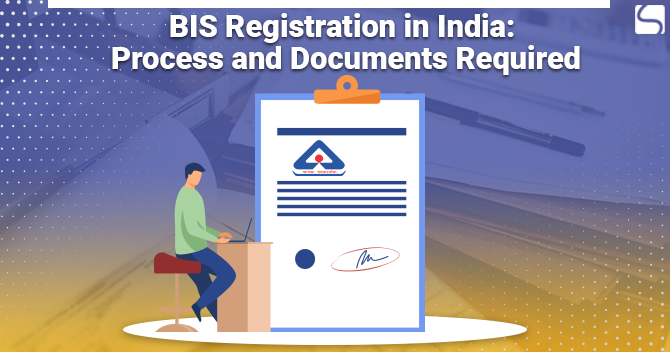
BIS Services
BIS Services stands for “Bureau of Indian Standards (BIS).” the national standards organization in India.The BIS Hallmarking Scheme has been aligned with International criteria on hallmarking.
Package Inclusion: –
- Documentation
- Application
- Regular follow-ups
- End-to-end support
- Testing Equipment Supply and Installation
- Product Testing and Training
- Calibrations

BIS services can include
- Product Certification (ISI Mark)
- Mandatory Product Certification (ISI Mark)
- Hallmarking
- Foreign Manufacturer Certification Scheme (FMCS)
- Compulsory Regulatory Scheme (CRS)
These services are often used by businesses to help them make strategic decisions, evaluate potential partners or competitors, and stay informed about market trends and developments. BIS services can be provided by specialized research firms, consulting companies, or other providers of business information and intelligence.
How BIS Certification helps businesses?
BIS is a conformity assessment scheme for products that are manufactured, imported, or sold in India. BIS certification helps businesses in several ways:
- Compliance: BIS certification ensures that a product meets the mandatory Indian safety, health, and environmental standards. Compliance with these standards is a legal requirement in India, and certification helps businesses avoid any legal or financial penalties.
- Market Access: BIS certification is a mandatory requirement for many products to be sold in the Indian market. Certification helps businesses gain access to the Indian market and expand their customer base.
- Consumer Confidence: BIS certification demonstrates to consumers that a product meets Indian safety standards and is of high quality. This can increase consumer confidence in the product and lead to higher sales.
- Competitive Advantage: BIS certification can provide businesses with a competitive advantage over non-certified products. Certification can be used as a marketing tool to differentiate products from competitors and demonstrate commitment to quality and safety.
- International Recognition: BIS certification is recognized by many international organizations and can help businesses comply with other international standards, such as ISI or CE, which can help them gain access to global markets.
Overall, BIS certification helps businesses meet regulatory requirements, gain market access, increase consumer confidence, and achieve a competitive advantage.
Documents required for BIS registration

The documents required for BIS registration may vary depending on the type of product being registered and the specific requirements of the Bureau of Indian Standards. However, the following are some of the commonly required documents:
- Manufacturers or Supplier’s Test Report: A test report from the manufacturer or supplier of the product, indicating that the product meets the relevant Indian safety, health, and environmental standards.
- Test Report from National Accreditation Board for Testing and Calibration and BIS approved laboratories: A test report from National Accreditation Board for Testing and Calibration and BIS approved laboratories indicating that the product meets the required Indian standards.
- Test reports provided by the labs shall not be more than 90 days
- GST Certificate / MSME Certificates/ Udyam Aadhaar Certificate/Rent Agreement/Sale Deed / Lease
Deed / MOA / MOU - Registration Certificate of Company: A copy of the registration certificate of the company that is manufacturing or importing the product.
- Authorized Indian Representative Agreement: An agreement with an authorized representative in India who will handle the
registration process on behalf of the manufacturer. (In Case of FMCS) - Technical Documents: Technical documents related to the product, including drawings, specifications, and other
relevant information. - Quality Control Procedures: A document outlining the quality control procedures used in the manufacturing process.
- Importer-Exporter Code: Importer-exporter code issued by the Directorate General of Foreign Trade (In Case of FMCS).
- Layout Plan/ Location Plan/ Process Flow Chart/ Process Description/Quality In charge Details
These are some of the common documents required for BIS registration, but the exact requirements may vary depending on the specific product and the BIS certification scheme. It is always recommended to consult with a BIS certification agency or an authorized representative for the specific requirements for your product.
- Manufacturers or Supplier’s Test Report: A test report from the manufacturer or supplier of the product, indicating that the product meets the relevant Indian safety, health, and environmental standards.
Who can apply for BIS registration?
BIS License can be applied for by manufacturers, representative of the manufacturer who is interested in selling or manufacturing products in India that fall under the scope of BIS certification. BIS certification is mandatory for certain products, such as electrical appliances, electronic goods, automobile components, and toys, Safety Products etc.
Manufacturers and Foreign Manufacturers who wish to sell their products in India must obtain BIS License before they can market their products in the country. Authorized representatives of foreign manufacturers can also apply for BIS License on behalf of the manufacturer. (In case of FMCS).
